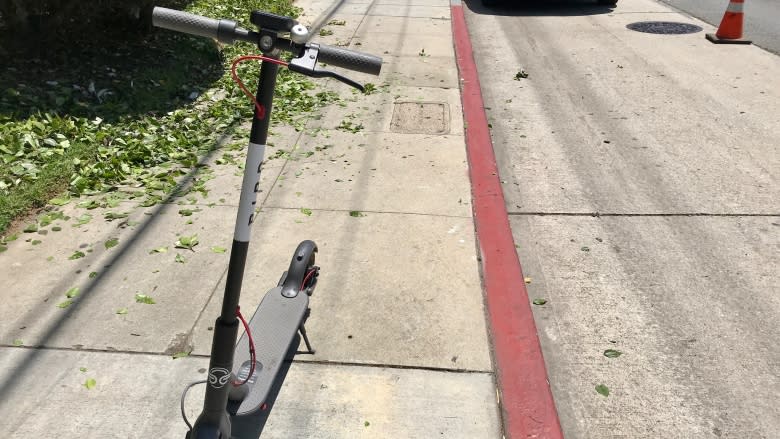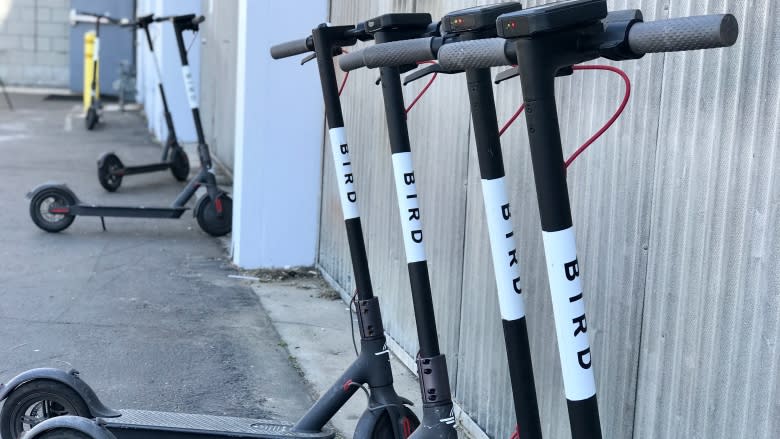Rental electric scooters disrupt California's economy — its sidewalks, too
Tarra Wood-Taylor lives in the heart of Silicon Valley, the home of disruptive technology, and her new and controversial mode of transportation has divided communities across the United States.
She demonstrates the concept of "take-it-and-leave-it" electric scooters. A few feet away is a lime-green scooter left standing on a San Jose street corner by a previous rider.
She fires up the LimeBike app, points her phone at the bar code and unlocks the scooter. She'll automatically pay for time and distance travelled and, when she's reached her destination, she'll simply nudge the kick stand and walk away.
"I can get to places on time faster than I could," Wood-Taylor says.
"I've also found them really helpful at night as a female. Instead of walking home and having to be completely paranoid that somebody is following me, I can hop on a scooter and feel safe."
Over the last eight months, three California companies have launched similar versions of these dockless scooters in major cities across the U.S. from San Francisco to Washington, D.C., promising to ease traffic and smog.
Bird Rides, one of the largest companies, has sold more than one million rides on its electric scooters since it launched in September, according to spokesperson Kenneth Baer.
Users download an app and pay $1 to unlock the scooter, plus 15 cents a minute to ride.
The company has no immediate plans to expand to Canada, but Baer says they hope to set up "wherever there are cars, wherever there is traffic, wherever there's people concerned about climate change."
"In the United States, 40 per cent of all car rides are less than two miles," Baer says. "That means that there's this real need in cities to find a way to get around from Point A to Point B which is not going to add to traffic and not going to add to carbon emissions."
Scooter riders zipping around at up to 24 km/h along downtown roads and beachfront paths are ubiquitous sights in cities such as Santa Monica, where they have proved a hit with tourists like Sandy and Doug Bowser, visiting from Picton, Ont.
"I think it would go big in Toronto," says Doug Bowser.
"They're parked all over," adds Sandy Bowswer, "and they're abandoned all over the place, too."
Which is why many people — especially city officials — view the scooters not as an innovative solution but as an annoying problem.
It's not uncommon to see the scooters weaving between pedestrians or parked in the middle of busy sidewalks, as if their operators had suddenly been transported by the Rapture mid-ride. It's led to the inevitable hashtag #scootersbehavingbadly.
According to Santa Monica's deputy city manager Anuj Gupta, Bird launched in the city by dumping hundreds of scooters on Santa Monica streets with little warning and no approval.
"The launch was not what we would have wanted and got us off on the wrong foot," Gupta says. "There was minimal — from my point of view insufficient — outreach or no real plan."
Hundreds of citations issued
According to California law, scooter riders must wear a helmet, have a driver's licence, stay off sidewalks, and ride solo. Too often, Gupta says, riders are breaking one or more of those laws. And at the end of their rides, many are leaving their scooters haphazardly, often blocking sidewalks.
Since Bird's launch, Santa Monica has issued hundreds of citations.
"It created a real and urgent public safety risk: there were a number of serious accidents involving riders who were riding them frankly in dangerous and unlawful ways," Gupta says.
Santa Monica city council passed an emergency ordinance to give city staff the ability to impound scooters blocking pathways. Gupta says the city even filed a criminal complaint against Bird for nine violations including "operating without a proper business licence" and "continued non-compliance with our business laws."
To resolve that complaint, Bird paid more than $300,000 US in fines and obtained the required permits.
But as we spoke, a man on a scooter rolled by Gupta on the sidewalk, without a helmet, violating two state laws.
Gupta could only smile wanly, saying Bird still has "a ways to go in terms of the company ensuring that they're doing their part to make sure riders comply with those requirements."
Several cities including San Francisco have issued cease-and-desist letters to companies like Bird and LimeBike, saying their services are a "public nuisance" that endangers public safety and ordering them to stop until their customers consistently park properly and wear helmets.
San Francisco authorities have seized more than 300 scooters, but the companies continue to operate.
In Hawaii, LimeBike scooters launched in Honolulu in mid-May without filing for proper permits. A week later, the company was ordered to cease operation, and many of its scooters were confiscated.
Last week the company announced it was ceasing operations on Oahu.
Growing pains
Baer, the Bird spokesman, says the problems arise from growing pains.
"It's a new technology for people, and so we need to educate them about the best way to ride and to park them," Baer says. "We're even piloting a new technology where when you park a Bird you need to take a picture of where you park so we make sure you're parking it in the correct spot."
The companies have offered to work with city officials to comply with local rules and to provide municipalities with free transportation data. But as for reaching out to jurisdictions before they launch, Bird won't be changing its modus operandi.
He does not belive it is necessary "to tell every city we're going to be coming in and wait to see what they want to do."
University of Southern California marketing professor Anthony Dukes says it's consistent with the business model pioneered by Uber, which has since become a common playbook for many Silicon Valley companies: disrupt first and apologize later.
"If they wait around for regulation and the public doesn't see the benefits, it's going to be a harder sell to regulators on allowing them to introduce this," Dukes says.
Rapid adoption, he says, is the key to survival. The tactics shouldn't come as a surprise; Bird Rides was founded by a former Uber executive. Now the race is on to convince scooter customers like Wood-Taylor that the convenience is a necessity, before local governments can stop them.
She believes it's up to the scooter riders, not the companies, to behave better.
"It's unfortunate that people can't respect something that is only trying to provide a way to have less cars, less pollution, less crap in the air for us to breathe," Wood-Taylor says.
Then she fires up a scooter and rolls off to her next gig.














